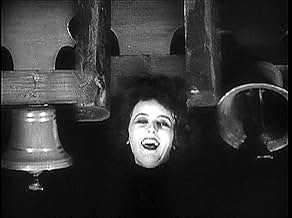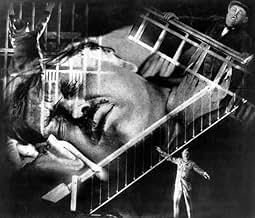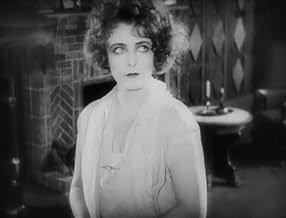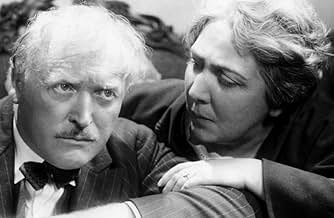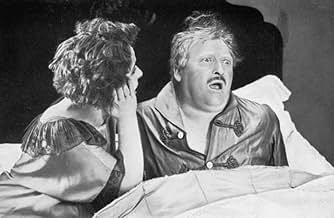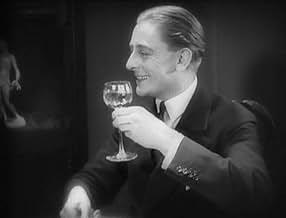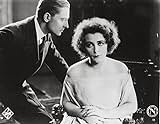IMDb RATING
6.8/10
862
YOUR RATING
A scientist is tormented by an irrational fear of knives and the irresistible compulsion to murder his wife.A scientist is tormented by an irrational fear of knives and the irresistible compulsion to murder his wife.A scientist is tormented by an irrational fear of knives and the irresistible compulsion to murder his wife.
Featured reviews
I come to this as someone who thinks the presentation of dreams - much more than dreams themselves - imitates the ways we use to structure the self that presents the world to us. Charting the cinematic effort of that is exciting to me.
And well, this is an interesting film to say the least, and from an interesting time. The backstory is that Freud himself approved of it and moreover sent two from his trusted Viennese circle to aid and supervise the UFA production on what would be a rational explication of psychoanalysis. You should know that his were radical , modern ideas in their time and for twenty years had been a sensation. And the Weimar public at large was struggling with deep-seated nightmares of their own, evidenced in Caligari and elsewhere, so it was very receptive to the new science for sleep, and probably every bit as confused about it as the somnambulist in Caligari.
But oh boy, haven't our narrative devices come far since Freud.
In the film, we have suddenly strange , unsettling urges followed by a puzzling nightmare, and then a psychoanalyst sits us down to kindly explain and assuage irrational fear.
Nevermind the obtuse focus on sex and symbolic interpretation of dreams, that was Freud. The emphasis on phallic imagery, the incidental aversion to knives linked to imaginary castration in the patient. Jung would make the transition to a character-based dreamworld, and we are growing out of that too. We are insanely more complicated beings these days than a logic like Freud's can explain, our dreams much more layered, and you can see that in contemporary filmmakers who are dabbling with dream.
We are unsure these days where day begins, that much (night) was certain then. Our dreams also come from movies and TV, from tweets and instagram, and we're beginning to understand what the Buddhist had been saying all along; the mind's function is to project snippets of narrative around a fictional self, and the most loaded dream is no different in mechanism to the most trivial thought. You are always at the center of an illusionary world you have set in motion, but you won't know that without a center in emptiness.
The trigger for it is something to consider though. A murder (by knife) has taken place the day before in the same street, a wife killed by the husband. The same urge somehow surfaces in our guy.
The actual nightmare has dated, along with the logic behind it and German expressionism. It is this eerie confluence of semiconscious machinery that still carries power. It is this aspect of dreaming Pabst would cultivate in later works.
And well, this is an interesting film to say the least, and from an interesting time. The backstory is that Freud himself approved of it and moreover sent two from his trusted Viennese circle to aid and supervise the UFA production on what would be a rational explication of psychoanalysis. You should know that his were radical , modern ideas in their time and for twenty years had been a sensation. And the Weimar public at large was struggling with deep-seated nightmares of their own, evidenced in Caligari and elsewhere, so it was very receptive to the new science for sleep, and probably every bit as confused about it as the somnambulist in Caligari.
But oh boy, haven't our narrative devices come far since Freud.
In the film, we have suddenly strange , unsettling urges followed by a puzzling nightmare, and then a psychoanalyst sits us down to kindly explain and assuage irrational fear.
Nevermind the obtuse focus on sex and symbolic interpretation of dreams, that was Freud. The emphasis on phallic imagery, the incidental aversion to knives linked to imaginary castration in the patient. Jung would make the transition to a character-based dreamworld, and we are growing out of that too. We are insanely more complicated beings these days than a logic like Freud's can explain, our dreams much more layered, and you can see that in contemporary filmmakers who are dabbling with dream.
We are unsure these days where day begins, that much (night) was certain then. Our dreams also come from movies and TV, from tweets and instagram, and we're beginning to understand what the Buddhist had been saying all along; the mind's function is to project snippets of narrative around a fictional self, and the most loaded dream is no different in mechanism to the most trivial thought. You are always at the center of an illusionary world you have set in motion, but you won't know that without a center in emptiness.
The trigger for it is something to consider though. A murder (by knife) has taken place the day before in the same street, a wife killed by the husband. The same urge somehow surfaces in our guy.
The actual nightmare has dated, along with the logic behind it and German expressionism. It is this eerie confluence of semiconscious machinery that still carries power. It is this aspect of dreaming Pabst would cultivate in later works.
There are a lot of important elements the restorers chose to omit from the movie. There are letters that are opened & are supposed to appear on screen for the audience to read. Gone. A man pulls up on a bike delivering a telegram. Gone. All references to the name of the man Martin Fellman are omitted. When he comes home after leaving his key,he sits down in front of the idol. It disappears leaving only a baby image. Gone. His wife see a dog & litter of puppies, She says: "I wish I had a child." Gone. The Murnau people made the movie incoherent by this censorship. Its a disgrace. They had no right to do these changes to the movie as they are not part of the creative process.
This film appears to be a relative to the common horror film and beautifully carves out its closeness to the psychoanalysis: Everyone who's busy with that genre can benefit from the Pabst film. It becomes pretty obvious during the insane and worth seeing dream sequences which foreshadows an Andalusian dog shot three years later. In a period of several minutes they form a phantasmagoric island within the film, which is continually reverted to during the analytic situations. An aesthetic experience of an unique quality, tremendously powerful in its imagery. But on the whole, the film has the effect of being too reduced, even perhaps reducing, too trimmed and too coarse in respect of content.
At the beginning of the last century, Herr Sigmund Freud was a notorious Austrian neurologist and psychiatrist who was famous for his innovative studies of mental diseases and the complicated unconscious mind. This led him to found psychoanalysis and write "Die Traumdeutung" ( The Interpretation Of Dreams ) a turning point in modern psychiatry that claimed the path to the unconscious could be found in dreams. Since aristocrats usually have nothing in their minds, psychoanalysis could do little to fill such a void but was very useful for average people whose more accessible simple minds made them good subjects for these innovative psychiatric methods.
"Geheimnisse Einer Seele" ( Secrets Of A Soul ) (1926) , directed by Herr G. W. Pabst, an Austrian like Herr Freud, is about this new psychoanalysis, a subject in fashion in Germany due to the complex and confused Teutonic minds, that Herr Pabst efficiently and aseptically describes in this film.
The film is famous for its notorious dream sequence in which a chemistry professor's unconscious fears come to the surface and threatens his marriage. It is all connected to an incident in the neighbourhood and the return of his wife's cousin from India.
The first half of the film shows the tranquil and bourgeois life of the professor together with his wife and the (at first) unimportant events that little by little will affect the professor's unconscious and will take shape in a traumatic dream. This is the most unique and interesting part of the film, the late Expressionist dream sequence, a nightmare, a nonsense puzzle that during the second half of the film will be analyzed and described with the help of a psychoanalyst, natürlich!.
Herr Pabst, due to his Teutonic and organized human nature, describes and solves every little detail shown during the powerful dream sequence with the knowledgeable help of the psychiatrist of the film; a coherent, logical and aseptic analysis that lacks emotion and rhythm so there is no room for mystery. The story also has a conservative and too conventional happy ending that throws the film a bit off balance and is too predictable given the odd subject matter.
That's what happens when you are an open-minded and common person, your innermost secrets are easily revealed, so unlike the wicked, empty and inscrutable aristocratic minds.
And now, if you'll allow me, I must temporarily take my leave because this German Count must wake up.
Herr Graf Ferdinand Von Galitzien http://ferdinandvongalitzien.blogspot.com/
"Geheimnisse Einer Seele" ( Secrets Of A Soul ) (1926) , directed by Herr G. W. Pabst, an Austrian like Herr Freud, is about this new psychoanalysis, a subject in fashion in Germany due to the complex and confused Teutonic minds, that Herr Pabst efficiently and aseptically describes in this film.
The film is famous for its notorious dream sequence in which a chemistry professor's unconscious fears come to the surface and threatens his marriage. It is all connected to an incident in the neighbourhood and the return of his wife's cousin from India.
The first half of the film shows the tranquil and bourgeois life of the professor together with his wife and the (at first) unimportant events that little by little will affect the professor's unconscious and will take shape in a traumatic dream. This is the most unique and interesting part of the film, the late Expressionist dream sequence, a nightmare, a nonsense puzzle that during the second half of the film will be analyzed and described with the help of a psychoanalyst, natürlich!.
Herr Pabst, due to his Teutonic and organized human nature, describes and solves every little detail shown during the powerful dream sequence with the knowledgeable help of the psychiatrist of the film; a coherent, logical and aseptic analysis that lacks emotion and rhythm so there is no room for mystery. The story also has a conservative and too conventional happy ending that throws the film a bit off balance and is too predictable given the odd subject matter.
That's what happens when you are an open-minded and common person, your innermost secrets are easily revealed, so unlike the wicked, empty and inscrutable aristocratic minds.
And now, if you'll allow me, I must temporarily take my leave because this German Count must wake up.
Herr Graf Ferdinand Von Galitzien http://ferdinandvongalitzien.blogspot.com/
There are many people who consider G. W. Pabst to be the finest director of German silent cinema. I am not one of them. I find his movies to be poorly paced and lacking in visual interest. They are kept afloat by their adult subject matter and by the performances of his female stars (Greta Garbo in THE JOYLESS STREET, Edith Jehanne and Brigitte Helm in THE LOVE OF JEANNE NEY, and of course Louise Brooks in PANDORA'S BOX and DIARY OF A LOST GIRL). A prime example of this is THE WHITE HELL OF PILZ PAULU co- directed by Pabst and Arnold Fanck and starring Leni Riefenstahl. Compare the dramatic scenes with the rest of the film and I think you'll see my point which brings me to SECRETS OF A SOUL.
This was Pabst's follow-up to the highly successful JOYLESS STREET (1925). The subject matter and the film's raison d'etre is the "new" subject of psychoanalysis. The breakdown of the protagonist and the fascinatng dream sequences (designed by Erno Metzner) are true to the film's Expressionist roots while the unfolding analysis of his problems are still of interest to a modern audience. There is also an amazing central performance from Werner Krauss as the patient undergoing analysis that really holds the movie together.
Krauss may be the finest German performer from that time period. He has a greater range than Emil Jannings and is less stylized than Conrad Veidt. Unfortunately very little of his work survives and his most famous role (CABINET OF DR CALIGARI) doesn't do him justice. This film does. Also check out his Iago in the 1922 version of OTHELLO and Orgon in the 1925 TARTUFFE (both opposite Jannings). SECRETS OF A SOUL is part of the Kino set GERMAN EXPRESSIONISM which contains 3 other films (CABINET OF DR CALIGARI, WARNING SHADOWS, and THE HANDS OF ORLAC). All of these films can be obtained separately although if you don't have the others I highly recommend the set...For more reviews visit The Capsule Critic.
This was Pabst's follow-up to the highly successful JOYLESS STREET (1925). The subject matter and the film's raison d'etre is the "new" subject of psychoanalysis. The breakdown of the protagonist and the fascinatng dream sequences (designed by Erno Metzner) are true to the film's Expressionist roots while the unfolding analysis of his problems are still of interest to a modern audience. There is also an amazing central performance from Werner Krauss as the patient undergoing analysis that really holds the movie together.
Krauss may be the finest German performer from that time period. He has a greater range than Emil Jannings and is less stylized than Conrad Veidt. Unfortunately very little of his work survives and his most famous role (CABINET OF DR CALIGARI) doesn't do him justice. This film does. Also check out his Iago in the 1922 version of OTHELLO and Orgon in the 1925 TARTUFFE (both opposite Jannings). SECRETS OF A SOUL is part of the Kino set GERMAN EXPRESSIONISM which contains 3 other films (CABINET OF DR CALIGARI, WARNING SHADOWS, and THE HANDS OF ORLAC). All of these films can be obtained separately although if you don't have the others I highly recommend the set...For more reviews visit The Capsule Critic.
Did you know
- TriviaSigmund Freud, whose book "The Interpretation of Dreams" largely influenced this film, was approached to serve as a consultant on psychoanalysis. Freud declined, believing that film could not capture the complexities of the science of psychoanalysis.
- Alternate versionsThere is an Italian edition of this film on DVD, distributed by DNA Srl: "I MISTERI DI UN'ANIMA (1926) + OMBRE AMMONITRICI (1923)" (2 Films on a single DVD), re-edited with the contribution of film historian Riccardo Cusin. This version is also available for streaming on some platforms.
- ConnectionsEdited into Die Geschichte des erotischen Films (2004)
Details
- Release date
- Country of origin
- Languages
- Also known as
- Le cas du professeur Mathias
- Production company
- See more company credits at IMDbPro
- Runtime
- 1h 37m(97 min)
- Sound mix
- Aspect ratio
- 1.33 : 1
Contribute to this page
Suggest an edit or add missing content

